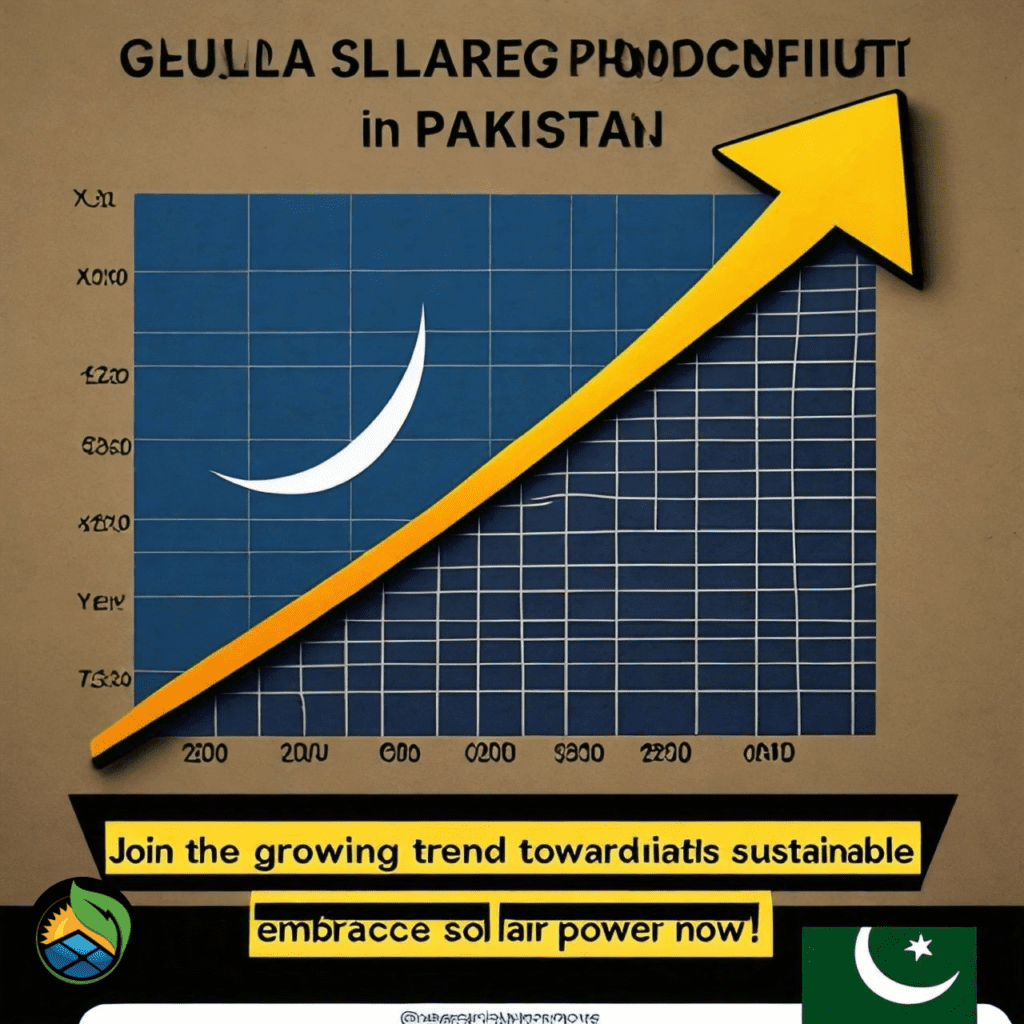Learn about the benefits of How much energy do solar panels produce in pakistan, including reduced reliance on fossil fuels, economic advantages, and government initiatives. Explore successful case studies and discover how solar energy can contribute to sustainable development for the country.
Pakistan’s expanding energy needs have led to an increasing popularity of solar panel power generation as an economical and ecologically benign option. The typical energy production from solar panels in Pakistan and the contributing variables will be examined in this article. We will also go into the obstacles in the way of its broad use, the advantages for the environment and the economy, and offer case studies of nationally successful solar projects. At last, we will examine the goals and programs of the government for the generation of solar energy and talk about its prospects for the future.
Pakistan Average Solar Panel Energy Production
In Pakistan, a one kilowatt (kW) solar panel system can generate about 5 kWh of energy daily on average. Available sunshine, solar panel efficiency, system size and type, tilt angle and orientation, shade, and dust can all affect this figure. Let’s examine daily and monthly estimations of the anticipated energy output from a solar panel installation in Pakistan.

A daily estimate
A panel’s wattage capacity and the number of peak sun hours in a day determine how much solar energy it can generate each day. Peak sun hours are the number of hours during which solar irradiance—the quantity of sunlight that reaches the surface of the earth—is at its highest. Peak sun hours vary throughout Pakistan from four to six hours a day, depending on the season and region.
Energy Produce Solar Panels in a 1 kW solar panel system may generate between 4 and 6 kWh of electricity daily.
Estimates By Month
The daily average is multiplied by thirty, the number of days in a month, to approximate monthly productivity. In Pakistan, a 1 kW solar panel system might generate between 120 and 180 kWh of electricity per month.
Examples According to System Size
Additionally significantly influencing a solar panel system’s energy output is its size. Though they can need more installation space and cost more up front, larger systems can also produce more energy. The following is some instances of Pakistani anticipated monthly energy production for various system sizes:
- 120–180 kWh per month for a 1 kW system
- Monthly kWh for a 5kW system ranges between 600 to 900
- Monthly kWh for a 10kW system range from 1200 to 1800.
Factors Affecting Solar Panel Power Production
A solar panel system in Pakistan can produce energy and be efficient depending on a number of variables. Planning for a solar installation requires taking these things into account in order to guarantee best performance.
Sunlight Availability
Sunlight entering a solar panel system has a big impact on how much energy it produces. Season, time of day, and weather patterns can all affect how many hours of sunshine there are in a day. Higher sunshine regions (like those in Pakistan’s south) would typically produce more solar energy than lower sunshine zones.
Solar Panel Efficiency
A solar panel’s efficiency describes how well it can turn sunshine into power. Though they may cost more, greater efficiency panels can generate more energy. In Pakistan, selecting solar panels means balancing cost and efficiency.
System Size and Type
As was already noted, a solar panel system’s size has a big effect on how much electricity it produces. Determining the size of a system also requires taking into account its type—off-grid, hybrid, or on-grid. To cover the energy needs of a home, an on-grid system, for instance, might need a bigger installation than an off-grid system.
Tilt Angle and Orientation
Solar panel energy output can also be impacted by their orientation and tilt angle. For best performance, Pakistani tilt angles should be between 15 and 25 degrees. Because Pakistan gets the most sunlight during the day, facing south is the best direction for solar panels.
Dirt and Shading
An obstacle like trees or other structures can have a big effect on how much electricity a solar panel system produces. Choosing the installation site with these things in mind will guarantee the best possible sunshine exposure. On solar panels, dust buildup can also lower their effectiveness, hence routine cleaning and maintenance are crucial.
Addressing Challenges
Though Pakistan has the capacity to produce solar electricity, there are still obstacles in the way of its broad use. Among difficulties are expensive initial outlay, little knowledge and instruction about solar energy, and a scarcity of licensed experts to install and maintain installations.

Government programs include net metering—which enables homes to sell extra energy back to the grid—and finance plans have been implemented to solve these problems and increase the affordability and accessibility of solar power for the general public. To further raise the number of qualified experts in the sector and inform the public about the advantages of solar energy, awareness campaigns and training courses are also being run.
Significant Installation Upfront Costs, Batteries Included
The expensive installation costs—which include batteries for off-grid systems—are one of the primary obstacles to the broad use of solar energy in Pakistan. For families with little money, the initial outlay might be a big obstacle.
Import Limitations and Inflation’s Effect on Prices
Government restrictions on the importing of solar equipment and technology can raise consumer costs. Inflation inside the nation has also added to the growing expense of solar systems.
For On-Grid Systems, Grid Dependency Time of Outages
Pakistani on-grid systems rely on the sometimes erratic national grid as a backup during power shortages. This emphasizes how stronger and more dependable energy infrastructure is required to back solar energy.
Batteries (for hybrid and off-grid systems) maintenance costs
Batteries are needed for energy storage in off-grid and hybrid systems; they must be routinely checked and updated. This can raise a solar system’s total upkeep expenses.
Benefits to Environment
Production of solar panels is a common option in Pakistan because of its various environmental advantages. Of these benefits are some of:
Reduced Reliance on Fossil Fuels and Lower Carbon Footprint
The energy industry in Pakistan mostly depends on fossil fuels including natural gas, oil, and coal. Adverse environmental effects result from the substantial contribution these non-renewable resources make to carbon emissions and air pollution. Pakistan can lessen its carbon footprint and dependency on fossil fuels by converting to the production of solar electricity.
Reduction of Water Needed for Energy Production
Pakistan’s water problem is exacerbated by thermal power plants’ need for enormous volumes of water for cooling. Contrarily, solar panel systems are more environmentally friendly because they produce power with little to no water.
Benefits to Economy
Production of solar panels provides various economic benefits in Pakistan in addition to its environmental ones. Those consist of:
Conserved Energy Costs
In Pakistan, using solar energy would help to drastically down energy bills for homes and businesses. Given the free and plentiful supply of sunshine, solar power can offer a long-term answer to energy needs.
Provision of Jobs
The solar energy promotion programs of the Pakistani government have led to the creation of new renewable energy-related jobs. In addition to creating jobs, this advances the economy of the nation.
Case Studies: Pakistani Solar Usage Examples
The following instances of successful solar installations in Pakistan serve to further highlight the possibilities and advantages of solar electricity in the nation:
Housing Project Burj Rafahia
Incorporating solar technology, the government-sponsored Burj Rafahia Housing Project is situated in Lahore. With almost 3000 apartments in the project fitted with solar panels, locals can now enjoy free electricity and depend less on the national grid.
Solar Park Quaid-e-Azam
In Bahawalpur sits the 1000 MW Quaid-e-Azam Solar Park. Being among the biggest solar parks in Pakistan, it has made a major contribution to the nation’s renewable energy output.
Thar Rural Electricity Project
Installing solar panels has allowed the Rural Electrification Project in Thar, a far-off desert area of Pakistan, to provide electricity to more than 40 villages. Apart from enhancing the living circumstances of the locals, this project has also lessened their dependence on fossil fuels and carbon emissions.
The Future and Governmental Projects
Pakistan’s great sunshine exposure offers it enormous potential for solar power generation. Understanding this potential, the government has launched a number of programs to encourage the nation’s usage of solar energy. These consist of starting national solar power projects, putting net metering laws into place, and providing tax breaks for solar systems.
Policies and Objectives of the Government for the Generation of Solar Power
With an eye toward solar power, the Pakistani government has established lofty goals to boost the nation’s supply of renewable energy. Among these goals is the 2030 realization of 30% renewable energy on the national grid.
Including five gigawatts (GW) of solar energy into the country’s electrical grid by 2025.
By 2030, ten percent of government buildings will have solar panels installed.
The government of Pakistan is committed to advancing solar energy and its potential to propel sustainable development in the nation, as seen by these programs and goals. The increasing energy needs of Pakistan can be met in large part by solar power, which can also support economic growth and environmental sustainability, with ongoing efforts and investment.
Market Development Prospects and Commercial Prospects
Significant market growth potential is presented by Pakistan’s growing need for solar energy. Through the provision of creative solutions including rooftop solar systems, solar-powered appliances, and portable solar devices, entrepreneurs and companies can capitalize on this potential.
Savings Over Time with Less Maintenance Needs
Installation of a solar system may seem expensive at first, but it saves money over time when compared to other energy sources. Long-term financial viability is increased by solar panels’ 25–30 year lifespan and low maintenance needs.
FAQs about Solar Panels Produce in pakistan
How much electricity does solar panels produce in Pakistan?
The amount of electricity produced by solar panels in Pakistan varies depending on various factors such as panel efficiency, sunlight availability, and system size. On average, a 1 kW solar panel can produce around 4-5 units of electricity per day.
What is the capacity of solar energy in Pakistan?
As of 2021, the total installed capacity of solar energy in Pakistan is approximately 2 GW. However, with government initiatives and targets for increasing renewable energy production, this capacity is expected to grow significantly in the coming years.
How many units can a 1 kW solar panel produce in Pakistan?
On average, a 1 kW solar panel can produce around 4-5 units of electricity per day in Pakistan. However, this can vary depending on factors such as panel efficiency and sunlight availability.
How much electricity does a 10kW solar system produce in Pakistan?
A 10 kW solar system can produce around 40-50 units of electricity per day in Pakistan. This amount can vary depending on factors such as panel efficiency and sunlight availability.
How much does 5 kW solar cost in Pakistan?
The cost of a 5 kW solar system in Pakistan can vary depending on the brand, type, and installation costs. On average, it can range from PKR 500,000 to PKR 700,000 (approximately USD $3,100 to $4,300
Conclusion
Pakistani production of solar panels has a bright future because of its many benefits and the government’s encouragement of renewable energy. One may optimize the advantages of solar energy in their homes and enterprises by taking into account elements like panel efficiency, sunlight availability, and system size. With ongoing sustainability initiatives, Pakistan can guarantee its people a future free from pollution and more sustainable through the generation of solar power. Thus, give switching to solar energy some thought right now!
